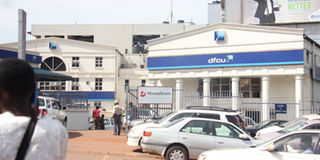Dfcu shareholders get dividends despite difficult business times

The old dfcu bank headquarters on Jinja Road Kampala. The bank management has resolved to move into their new home in Nakasero by August. PHOTO BY ABUBAKER LUBOWA
What you need to know:
Losses. The bad debt from loan advances grew from Shs11billion to Shs13billion.
Kampala.
Dfcu bank shareholders will get dividends despite the hard economic times the financial industry has endured in the previous years.
The bank board has recommended a dividend of Shs17.8 per share for shareholders.
In addition to the cash dividends, upon regulatory approval, the shareholders will also get bonus shares in the proportion of one new bonus share for every one share currently owned.
Bonus shares are additional shares given to the current shareholders without any additional cost, based on the number of shares that a shareholder owns. These are company’s accumulated earnings which are not given out in form of dividends, but are converted into free shares.
Speaking at the annual general meeting yesterday, dfcu bank managing director Juma Kisaame, said the bank had to fulfill its promise to shareholders despite bad economic times, resulting from the global recession, that has hit financial institutions hardest.
“Last year, we experienced difficult economic times not just as a bank but as an industry as well. The bad times are still hovering but we will try to deliver on our promises,” Mr Kisaame told the shareholders yesterday. Despite recording a profit of Shs34billion after tax and keeping the operating cost within fairly reasonable range, Mr Kisaame said the bank came short in collecting its debts, something that did not go down well with a cross-section of the shareholders.
“Our bad debt grew from Shs11billion to Shs13billion. This is not the best, but it is an area that we are watching keenly,” Mr Kisaame said.
He added: “And for that, we are going to be more careful with the kind of funding we give in future, we will reschedule loan payment for those who are having difficulties to pay on time and as a last resort—when everything else fails, we will reclaim the security.”
Mr Laman Masaba, a shareholder, said the management must do more in dealing with bad loans because it affects profitability and dividends the shareholders get.
Need to preserve capital and build more retail branches
According to Mr Kisaame, the need to recommend the share bonus was informed not only by the need to preserve capital but also the desire to build more retail branches and increase financial inclusion—recruit as many people with Dfcu as possible. “With share bonus currently trading at Shs1200, this means that it is the shareholder that is going to end up more wealthy,” Mr Kisaame said. Meanwhile, Mr Keith Kalyegira, the chief executive officer Capital Markets Authority has applauded the bank saying it is moving in the right direction. According to Mr Kalyegira, what the bank has done by giving bonus shares is not abnormal but a prudent move that shareholders will find beneficial. This, he said is important in preserving capital.




